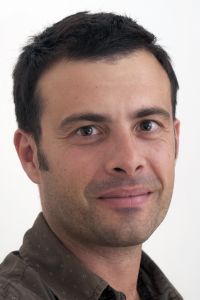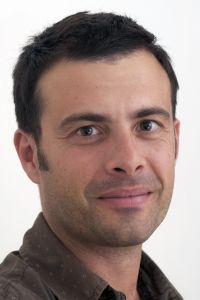 Professor Roberto Perez, who died on September 7th this year, was a Physiotherapist by profession, and Professor of Pain and Pain Therapy Research at VU University Medical Centre, Amsterdam. He was the current Chair of the IASP Special Interest Group for Complex Regional Pain Syndrome (CRPS) and Secretary for the International Research Consortium for CRPS. His clinical and research interests were focused on Palliative Care and CRPS, and he contributed a remarkable amount to both fields. Roberto was an exceptional clinical academic in so many ways.
Professor Roberto Perez, who died on September 7th this year, was a Physiotherapist by profession, and Professor of Pain and Pain Therapy Research at VU University Medical Centre, Amsterdam. He was the current Chair of the IASP Special Interest Group for Complex Regional Pain Syndrome (CRPS) and Secretary for the International Research Consortium for CRPS. His clinical and research interests were focused on Palliative Care and CRPS, and he contributed a remarkable amount to both fields. Roberto was an exceptional clinical academic in so many ways.
I first met Roberto approximately 10 years ago in ‘The Pig and Fiddle’, a popular ‘pub’ in Bath, UK, which remained a regular favourite haunt of Roberto’s. He had a framed menu on his work desk that the pub’s staff had signed to congratulate him on becoming a full Professor in November 2016. Beer and Roberto were always an excellent combination for relaxed chat about his two passions in life- work and family. It was a great place to start a very happy friendship and productive research collaboration.
At that time Roberto was a lead contributor within The Netherlands, TReND (Trauma Related Neuronal Dysfunction) Consortium. My colleagues and I had invited Roberto to present at our annual CRPS conference and from the outset I knew that Roberto was someone to stay in touch with and learn from. To my mind, Professor Bob van Hilten, Professor Han Marinus and Roberto were the three key ‘amigos’ of TReND. Roberto was the young career researcher who was supposedly there to learn from his wiser peers (Roberto’s perception), but somehow he was also the one who was in the thick of TReND, directing key research projects and providing seemingly endless energy to help make TReND one of the most productive collaborations to date in the world of CRPS research.
Roberto had an extraordinary ability to remember detail. Dates, author’s names, research data, year of a journal publication, or final recommendations in a paper, were all facts that were instantly accessible to Roberto. At those quiet points in a meeting, when someone was struggling to retrieve a key fact, Roberto would always supply the missing information, set it in context and tell us what further work was relevant. He was never reticent in respectively correcting a colleague if a detail was wrong, or if the evidence-base was weak for their supporting argument. Roberto was a stickler for the evidence. He was our evidence-based ‘lodestone’. We all looked to him to affirm or correct the arguments we put forward for a new treatment or research approach.
Roberto was born in Terneuzen, The Netherlands but his family were Italian, and everything about him was Italian. He was good looking, charming, a great cook, musician and linguist. Roberto spoke Dutch, Italian, English and German fluently, but actually he appeared to be able to communicate to anyone, anywhere. He seemed to have a natural talent for languages and accents. Whilst visiting Japan for the 2016 IASP, I had every confidence that Roberto would steer us through challenging menus in those post-meeting, happy groupings of people where you start with a table for ten and end the night with twenty-five. Roberto never let us down. He befriended the restaurant /bar staff within moments of arrival, had the back-story of their lives and the businesses they worked in. Always effortlessly polite to all he met, you just knew you were going to have a good evening with Roberto there.
He was an excellent communicator and acted with humanity in everything he did. By the nature of Roberto’s work he conducted multidisciplinary research, which required him to regularly work with patients, representatives of patient charities, and academic and clinical staff from a wide range of grades and professional backgrounds. Roberto treated everyone the same, as an equal. He actively listened and took on board the views presented by any member of a research team, no matter how junior they maybe. He particularly championed the patients’ voice and was a close friend of the Dutch National CRPS Patient Organization. I had the pleasure to work with Roberto on two large, international collaborative projects and everyone was a personal friend of Roberto’s. His untimely death hit us all equally hard.
Roberto loved his work and he worked hard. Exceptionally hard. It wasn’t until I had known him for a couple of years that I realised he only worked ‘part-time’ on CRPS research. The volume of outputs and the range of topics he covered within the world of CRPS would never have given you any indication of this. He was often the first to volunteer for a role, provide feedback on a draft manuscript or set the ‘ball rolling’ in planning an international meeting. The other half of his working week was dedicated to advancing the care of people receiving palliative care. When I eventually met his colleagues from Palliative Care it was extraordinary to learn how they too thought Roberto only worked for them, because his energy, passion and volume of academic output equalled that of his CRPS work.
At the centre of Roberto’s life was his family. His partner Andrea and his daughters Sofia and Giulia were a huge source of pride and support to him. He always had a picture to show you of any one of them and was keen to share with you all of their latest achievements. His paternal instincts also encompassed his many PhD students who he was also immensely proud of, and keen to develop to the best of their potential. The other picture Roberto was always keen to share with you was that of any bird he had recently spotted. He was a very keen ornithologist and, of course, remarkably knowledgeable on the topic. Just this year he excitedly shared with me the news that he and his family had seen a Sea Eagle and Osprey on the same day off the coast of The Netherlands. It was so very typical of Roberto that even when his life was at its most challenging he was able to find pleasure and excitement from the world around him.
Professor Roberto Perez was at the centre of our CRPS research ‘family’ and the magnitude of our loss is only just starting to be realised. If, as a community we can try to maintain his standards and humanity in our future work then we can only benefit from this, however, our challenge is that he set the bar so incredibly high.
About Candy McCabe
 Professor Candy McCabe is the Florence Nightingale Foundation Chair in Clinical Nursing Practice Research at the University of the West of England, Bristol and the Royal United Hospitals NHS Foundation Trust, Bath UK. She trained as a nurse at St. Thomas’ Hospital, London and after working in a variety of specialties including ward based and research work she moved to the Royal National Hospital for Rheumatic Diseases (RNHRD), Bath in the mid- 90’s. Since this time her research and clinical interests directly relate to increasing our understanding of the mechanisms and potential therapies for those with chronic unexplained pain, particularly that of Complex Regional Pain Syndrome (CRPS) and other Rheumatology and neuropathic pain conditions. She leads a multi-disciplinary Clinical Research team that provides national services for those with CRPS and for those suffering with Complex Cancer late effects.
Professor Candy McCabe is the Florence Nightingale Foundation Chair in Clinical Nursing Practice Research at the University of the West of England, Bristol and the Royal United Hospitals NHS Foundation Trust, Bath UK. She trained as a nurse at St. Thomas’ Hospital, London and after working in a variety of specialties including ward based and research work she moved to the Royal National Hospital for Rheumatic Diseases (RNHRD), Bath in the mid- 90’s. Since this time her research and clinical interests directly relate to increasing our understanding of the mechanisms and potential therapies for those with chronic unexplained pain, particularly that of Complex Regional Pain Syndrome (CRPS) and other Rheumatology and neuropathic pain conditions. She leads a multi-disciplinary Clinical Research team that provides national services for those with CRPS and for those suffering with Complex Cancer late effects.
Candy is a member of a number of national and international committees in the specialties of rheumatology and pain, co-founder and Chair of the CRPS UK Clinical Research Network, and Chair of the Scientific committee for the International Research Consortium for CRPS. She is the immediate past-Chair of the IASP Special Interest Group for CRPS, and a past-member of the British Pain Society Scientific Committee.



